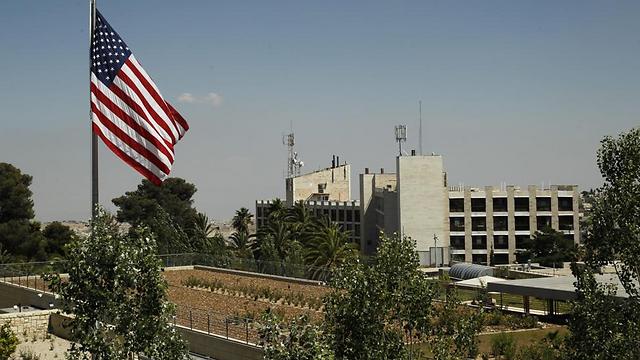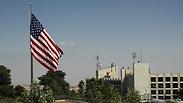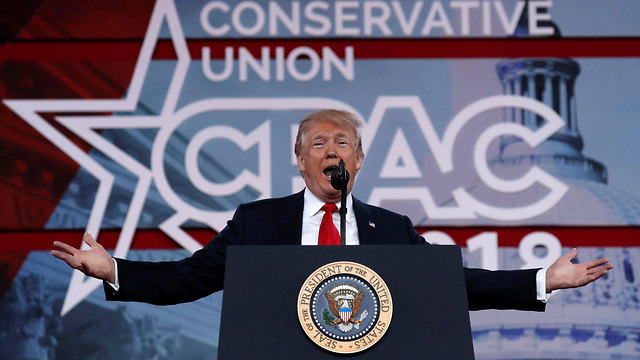
US says Jerusalem embassy to open in May, Palestinians furious
Expedited move sets to coincide with 70th anniversary of Israel declaring independence; Netanyahu: 'Move will make Israel's 70th Independence Day a much greater celebration'; Hamas calls move 'declaration of war'; PLO official Erekat: 'US are part of the problem.'
The United States Embassy in Israel will move from Tel Aviv to Jerusalem in May 2018 to coincide with the 70th anniversary of Israel declaring independence, the State Department confirmed Friday night.
"We are excited about taking this historic step, and look forward with anticipation to the May opening," State Department spokeswoman Heather Nauert said.
The embassy in Jerusalem will be gradually expanded in existing consular facilities in the Arnona neighborhood, while the search for a permanent site has already begun for what Nauert called a "longer-term undertaking."

The interim embassy will have office space for the ambassador and a small staff and, by the end of 2019, a new embassy annex on the Arnona compound will be opened, Nauert said in a statement.
The consulate in east Jerusalem will continue to serve Palestinians, and for security reasons US Ambassador David Friedman will continue living in the residence in Herzliya, north of Tel Aviv, and commute to the relocated embassy, another official said, speaking on the condition of anonymity.
Trump administration officials said Congress was notified of the impending move. Secretary of State Rex Tillerson signed off on the security plan for the new embassy on Thursday.
Prime Minister Benjamin Netanyahu praised the US decision, saying it "will turn Israel's 70th Independence Day into a much greater celebration."
"This is a great day for the people of Israel," Netanyahu noted in a statement released Friday night. "Thank you, President Trump, for your leadership and your friendship."
Palestinians reacted with anger to the move, saying this could destroy the prospect of a two-state solution to the Israel-Palestinian conflict.
Saeb Erekat, the Palestinian's chief negotiator in peace talks that have been frozen since 2014, said the US move showed a "determination to violate international law, destroy the two-state solution and provoke the feelings of the Palestinian people as well as of all Arabs, Muslims and Christians around the globe."
Erekat, who is also secretary-general of the Palestine Liberation Organization, went on to say that US President Donald Trump and his team "have disqualified the US from being part of the solution between Israelis and Palestinians; rather, the world now sees that they are part of the problem."
He further lamented the fact the move would coincide with the Nakba Day—the 1948 Palestinian exodus, or how the Palestinians refer to the establishment of Israel.
Nabil Abu Rdainah, a spokesman for Palestinian President Mahmoud Abbas, also slammed the move, saying, "This is an unacceptable step. Any unilateral move will not give legitimacy to anyone and will be an obstacle to any effort to create peace in the region."
Abbas has rejected US-led Middle East peace efforts as "impossible" since Washington's decision.
Abu Rdainah said the only way to achieve peace, security and stability was Abbas's proposal—outlined in an address to the United Nations Security Council in New York on Tuesday—that an international conference should be held to kick-start the peace process, including a "multilateral mechanism" to oversee it.
Abbas is still in the United States after undergoing medical checks in Baltimore on Thursday but will leave on Saturday, Abu Rdaineh said.
In Gaza, a Hamas official, Sami Abu Zuhri, said that "Moving the US Embassy to Jerusalem is a declaration of war against the Arab and Muslim nation, and the US administration must reconsider its move."
Israel will this year celebrate the anniversary on April 19-20. Israel proclaimed independence on May 14, 1948.
A ribbon-cutting ceremony for the new American embassy is being planned for mid-May.
The May opening marks a significant acceleration. Vice President Mike Pence had said previously the embassy would open by the end of 2019, while Tillerson had said it could take years.
Prime Minister Benjamin Netanyahu is in contact with the US administration and will respond if and when an American announcement is made on the planned US Embassy move, an Israeli government source said on Friday.
The source added that Netanyahu did not ask President Trump to advance the opening of the embassy, and was not involved in the decision to do so.
Intelligence Minister Yisrael Katz on Friday congratulated Trump for expediting the embassy's move. "There is no greater gift than that! The most just and correct move. Thanks friend!" Katz said in a Twitter posting.
Pressured against the move
In a speech on Friday to a gathering of conservatives in suburban Washington, Trump recalled his controversial decision, saying he withstood enormous pressure to make the move.
"I put the word out that I may do it. I was hit by more countries and more pressure and more people calling, begging me 'Don't do it. Don't do it. Don't do it,'" Trump said.
"I said we have to do it. It's the right thing to do. It's the right thing to do, we have to do it. And I did it."
He said the campaign against moving the embassy was "incredible," but noted the campaign in favor of moving the embassy was also incredible.
In December 2017, Trump announced that the United States officially recognizes Jerusalem as the capital of Israel and will move its embassy there, breaking with longtime US policy
"I have determined that it is time to officially recognize Jerusalem as the capital of Israel," he announced, calling it "overdue" and in the best interests of the United States.
Trump further stressed recognition acknowledged the "obvious," that Jerusalem is the seat of Israel's government despite the disputed status that is one of the key elements in the Israeli-Palestinian conflict.
"Israel is a sovereign nation with the right like every other sovereign nation to determine its own capital," Trump asserted. "Acknowledging this as a fact is a necessary condition for achieving peace."
Elior Levy, Moran Azulay, Itamar Eichner, Reuters and The Associated Press contributed to this report.

















